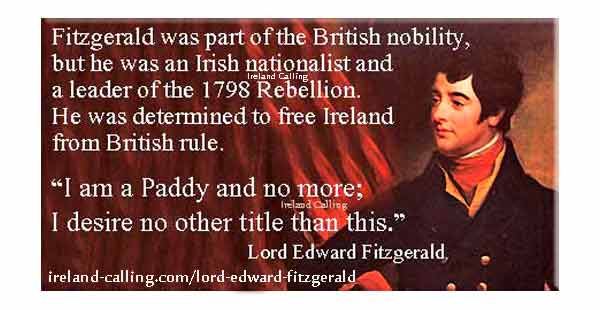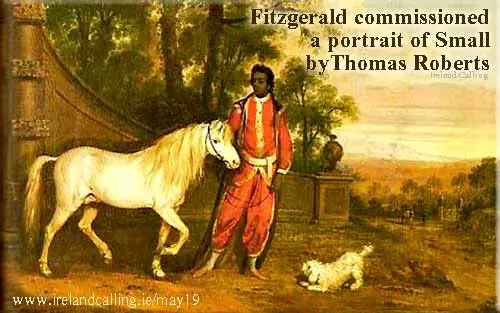Lord Edward Fitzgerald was a member of the British nobility who renounced his privileged background to become an Irish nationalist. He described himself as “a Paddy and no more”. He was one of the leaders of the 1798 Rebellion and was so successful that the authorities placed a £1,000 bounty on his head. He was eventually arrested for treason after being betrayed by one of his associates.
Fitzgerald was born in Co Kildare into a wealthy family and joined the British army. He fought for Britain in the American Revolutionary War and was badly wounded in the Battle of Eutaw Springs. His life was saved by a slave named Tony Small. When Fitzgerald returned to Britain, he had Small freed and employed him as thanks for saving his life.

Fitzgerald served as an MP for various constituencies in Ireland after his brother had secured him the posts. However, Fitzgerald didn’t take an active interest in politics. He was young and adventurous and instead spent a year exploring across the unknown regions of Canada and North America.
He moved to France and became swept up with the fervour over the French Revolution, so much so that he denounced his own titles, for which he was dismissed from the army. He fell in love and married a local woman and returned to Ireland with his new wife.
Fitzgerald immediately took up his seat in the House of Commons and publicly declared his support for the United Irishmen, the nationalist organisation determined to free Ireland from British rule. Fitzgerald became an active, and even leading member of the United Irishmen. Because of his political background and nobility, he had the contacts and influence to gather support for the Irish cause.
He traveled to Germany to gain arms for the nationalists for a planned rebellion, but some of the other leaders wanted to wait to gain the support of the French. By this stage the British authorities were well aware of the planned rebellion after being tipped off.
Many of the leaders were arrested and faced the death penalty for treason, but Fitzgerald avoided arrest because of his upper class status. The British government were desperate not to have to arrest and execute Fitzgerald, because it would be highly embarrassing for them that a member of the British nobility was leading an Irish rebellion against them. One British official reportedly told a member of Fitzgerald’s family:
“For God’s sake get this young man out of the country; the ports shall be thrown open, and no hindrance whatever offered.”
However, Fitzgerald refused to leave. He wouldn’t abandon his men to arrest and execution without him fighting by their side. He didn’t want to escape if his comrades didn’t have the same opportunity. The government issued the order for the military to arrest all known members of the United Irishmen. This left Fitzgerald and his followers with no choice but to issue the order of rebellion without the help of the French. A £1,000 bounty was placed on Fitzpatrick’s head, as the most high profile and powerful United Irishmen leader still at liberty. Despite this, Fitzgerald disguised himself and was able to visit his wife on more than one occasion.
However, before Fitzgerald could lead the Irish nationalists into rebellion he was apprehended by the British army. They had been informed of his whereabouts by a United Irishmen traitor, Francis Magan. Fitzgerald fought with the arresting officers, fatally stabbing one and injuring another. He was only subdued after he was shot in the shoulder.
In prison, he was not given the necessary medical attention and his wound became infected. His wife was forced to flee the country without seeing him, as she would also be charged with treason. Fitzgerald died from his injury on the 4th June 1798 aged 34, as his United Irishmen comrades fought for their freedom across Ireland.

After his death, Fitzgerald’s sister issued a statement on his behalf:
“Irishmen, Countrymen, it is Edward FitzGerald’s sister who addresses you: it is a woman but that woman is his sister: she would therefore die for you as he did. I don’t mean to remind you of what he did for you. ‘Twas no more than his duty.
“Without ambition he resigned every blessing this world could afford to be of use to you, to his Countrymen whom he loved better than himself, but in this he did no more than his duty; he was a Paddy and no more; he desired no other title than this.”
Fitzgerald had previously said that he was a ‘Paddy’ and no more, and that he ‘desired no other title’.
Click here to read more about Irish history and the main characters involved in the major events
Lord Edward Fitzgerald – British noble in the 1798 Rebellion
